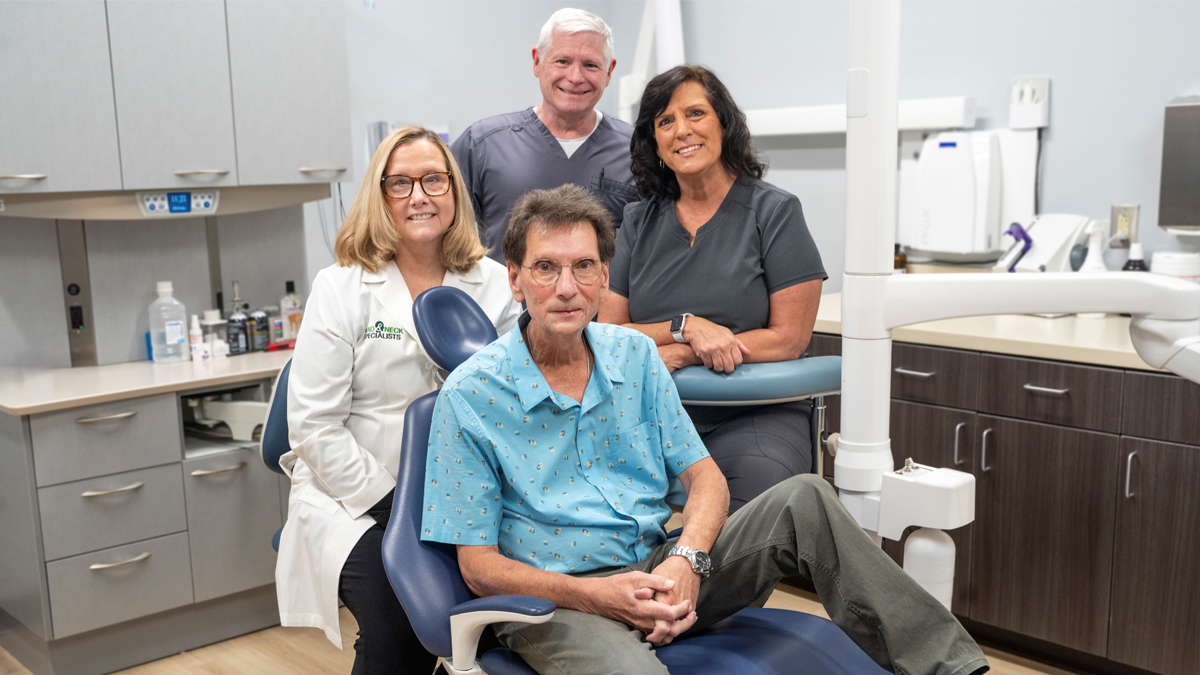John Thornton had some serious chops when it came to playing his axe. In his case, that means he was a great trumpeter. He played in local jazz bands and in bands for well-known singers and groups like the Four Tops and the Temptations. He even taught at the Charleston Jazz Academy.
Then, in 2022, he observed an alteration in how he played. At the time, he didn’t realize it would also alter his life. “When I played, I noticed air was being directed into my sinuses,” he recalled.
A nonmusician probably wouldn’t have even detected it, but Thornton visited his primary care physician to have it examined. What the doctor saw was concerning, so he sent Thornton to a specialist – it turned out that he had tonsil cancer, an uncommon form of the disease. The American Cancer Society estimates that in 2024, more than 21,000 people in the United States will develop a type of oropharyngeal cancer, including tonsil cancer – only about 1% of this year’s cases.
“Head and neck cancers are one of the most devastating cancers for a patient because it can’t be hidden,” said Dr. Betsy Davis with Head & Neck Specialists in Charleston.
Most cancerous tumors or surgery scars can be concealed by clothing, but, with head and neck cancers, the results are often on full display. They are also different in that they can affect all the senses. Patients who lose their sense of taste, sight, hearing, smell or touch or have one or more of them changed because of cancer might have to deal with a major impact on their quality of life.
Thornton didn’t panic, instead focusing on what needed to be done. His doctor recommended six rounds of chemotherapy and 35 radiation treatments over roughly a two-month period. While daunting, the worst part was discovering that all his teeth would have to be removed to facilitate the cancer treatment. The doctor didn’t want to risk him getting an abscess or infection that might kill him.
“My first thought was, ‘There goes my career,’” Thornton reflected. He couldn’t play a trumpet without teeth. “It was tough news to hear.”
While not among the most common or deadliest cancers, it can be argued that head and neck cancers have some of the most traumatic effects on patients. “Every incision a head and neck surgeon makes is seen,” said Dr. Eric Lentsch with Head & Neck Specialists. “It can weigh very heavily on a patient.”
To help patients deal with the emotional and mental aspects of head and neck cancers, Head & Neck Specialists address the problem with a multidisciplinary team to attack the situation comprehensively. Not only can they do surgeries and administer radiation, chemotherapy and immunotherapy, they offer survivor support, nutrition support, prosthetics, swallowing therapy and more.
Thornton trusted his physicians and knew they had his best interests in mind and the skill to help him. The treatments were rough, though. His weight dropped from 168 to 133 pounds. “It hurt to swallow water,” he said.
However, his doctors urged him to force himself to eat and drink. If he didn’t, the possibility existed that he might lose the ability to swallow and have to relearn it. When Thornton was rechecked after his treatments, the tonsil cancer appeared to be in remission, but new spots were seen on his lungs. He began an immunotherapy treatment to combat that cancer, which is going well.
Once he had regained some of his strength, he returned to teaching last year. He also decided that he wanted to start playing the trumpet again. This would be hard to do with the dentures he wore. “When I play, I need something firm to press up against my lips,” he said. “Dentures tend to slip.”
He asked Dr. Davis about getting permanent teeth implanted. This involved surgeries to implant posts into his jaw, which teeth were then attached to.
Dr. Davis has spent most of her career using emerging technology to help patients with head and neck cancer. One of the latest advancements has been to use 3D printing to create prosthetic replacements for body parts patients have lost due to cancer. Her work earned her The Andrew J. Ackerman Memorial Award, a lifetime achievement award, from the American Academy of Maxillofacial Prosthetics.
“The most rewarding thing is that when you finish, the patient looks at you with their restored smile,” she said.
Following the surgeries, Thornton needed to recover, and then new dentures were made to fit around the permanent teeth. Finally, he was able to start playing again. “I had to relearn certain things, but the more time I spend with the horn on my face, the easier it gets,” Thornton said.
He says he is not back to playing at his former level yet, but he’s getting there. Thornton has also found that he is playing differently because the permanent teeth and dentures have changed his embouchure, which is how the jaw and lips fit around the trumpet mouthpiece.
He has also regained some of his lost weight and his health is good overall. “Little by little, I’m coming back,” he said.
There are things people can do to reduce the risk of developing head or neck cancer. “A dentist can be your first line of defense against cancer,” Dr. Lentsch said. Dentists and hygienists can often see the early warning signs of some cancers and catch them early.
Other preventative measures include:
- Keeping up with your oral hygiene.
- Not smoking or using tobacco.
- Moderating your alcohol intake.
- Avoiding HPV.
“If something doesn’t feel right, go to your doctor,” advised Dr. Davis. That is just what Thornton did, and it may have saved his life. It also gave him a chance to continue with a career he loves. At the same time, doctors like Davis and Lentsch continue exploring new ways to not only fight cancer but to repair the damage head and neck cancer can cause.
By James Rada Jr.







